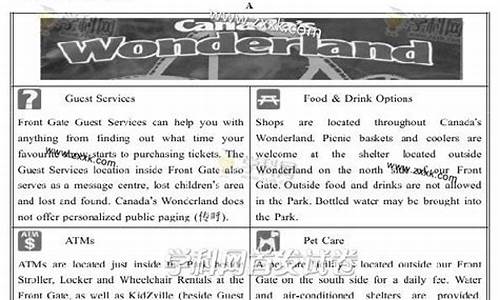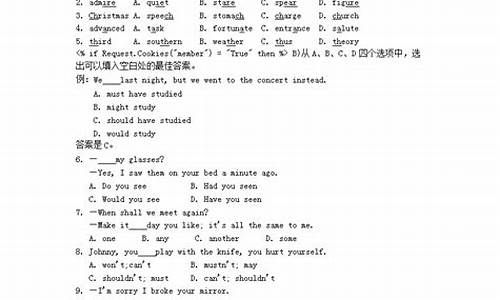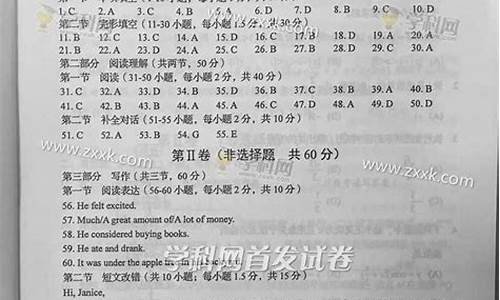您现在的位置是: 首页 > 教育研究 教育研究
2013江苏高考英语试题,2013年高考江苏卷英语
tamoadmin 2024-06-19 人已围观
简介1.高中英语单项选择中,what 和 that的用法区别,求详解,江苏高考中常考的那种。2.2022江苏高考英语难吗3.江苏英语高考满分多少您好,希望对你有帮助。高考常用动词短语归纳: look 的常用短语:look up … in查找look sb. up and down 上下打量look back to/ upon回顾look upon…as把… 看作look forward to期待l
1.高中英语单项选择中,what 和 that的用法区别,求详解,江苏高考中常考的那种。
2.2022江苏高考英语难吗
3.江苏英语高考满分多少

您好,希望对你有帮助。
高考常用动词短语归纳:
look 的常用短语:look up … in查找
look sb. up and down 上下打量
look back to/ upon回顾
look upon…as把… 看作
look forward to期待
look through浏览; 看穿
take a new look呈现新面貌
fear的常用短语:in fear害怕地
(be) in fear of 害怕
for fear of/ that担心;生怕
concentrate 的常用短语:concentrate on 专心…
concentrate one’s mind on 专心于…
类似的短语:
fix one’s mind upon
focus on
put one’s heart into
focus one’s mind on
surprise常用短语:in surprise惊讶地
to one’s surprise 使某人惊讶的是
be surprise at/to do/that
对某事感到惊讶
表示“穿衣”的动作或状态的词和短语1.表示动作的有:
pull on
put on
dress
dress sb
2. 表示状态的有:
wear
be in
be dressed in
have … on
常见表“喜欢”的短语和单词like
care for
be keen on
be fond of
take delight in…
trouble的常用短语:have much trouble / no trouble (in) doing 在…有/没有困难
take great trouble to do
不辞辛劳做某事
put sb to the trouble of doing …
为难某人做某事
make trouble捣乱
be in (great) trouble
惹麻烦;处在困境中
help sb. out of trouble
帮某人摆脱困境
end的常用短语:come to an end……结束
put an end to 结束……
on end竖起, 连续
in the end终于; 最后
end up (by) doing…以……结束
make both ends meet收支相抵
表示“导致”、“由…引起”的短语:1. 导致
cause sth. (to do)
result in
lead to
2. 由……引起
be caused by
result from
grow out of
lie in
表“全力以赴”的短语:do / try one’s best
spare no efforts to do
take great pains to do
go all out to do
do what somebody can (do) to do
do all somebody can (do) to do
direction常用短语:in (the ) direction of….朝……方向
under the direction of ...在……的指导下
follow the directions照说明去做
far常用短语:far from (being)离……要求相差很远
far from +(a place)距离某地很远
far away遥远
so far 到目前为止; 那么远
as far as sb. knows/sees据某人所知
by far
(最高级前,比较级后)起强调作用
distance常用短语:in the distance在远处
from/ at a distance从远处
keep sb. at a distance
于某人保持一定距离
It is no distance at all.不远
use常用短语:used to do过去曾经、常做
be used to doing …习惯于……
be used to do被用来做……
make good/ full use of充分利用……
come into use开始使用……
it is no use doing …干……没有用
“出了什么事”的几种不同表达What’s wrong with….?
What’s the matter with…?
What’s the trouble with…?
What happened (to sb.) ?
“众所周知”常用表达法:It is known to all that…主语从句,that不能省
As is known to all,定语从句,置于句首
We all know (that)后接宾语从句
Everyone knows (that)后接宾语从句
, which is known to all.非限定从句,置于句末
表“同意某人意见”的常用短语:agree with sb. /what sb. said
agree to sth.
approve (of) sth.
in favour of sth.
be agreeable to sth.
be for sth.
“不同意”
disagree with sb./ what sb. said
object to sth.
disapprove (of) sth.
be against sth.
sign的常用短语:sign one’s name签名
sign to sb (not) to do sth.
示意某人(不)做某事
signs of …
……的迹象
would rather 与 prefer 的区别1.宁愿做……而不做……
would rather do A than do B
prefer A to B
prefer to do A rather than do B
2. would rather 主语 + 过去式,表示“宁愿”
eg. I would rather you came tomorrow than today.
should prefer sb. to do sth./ should prefer 主语 + 过去式,表示“比较喜欢……”
eg. I should prefer you not to go there alone.
OR: I should prefer that you did not go there alone.
trap常用短语be caught in a trap落入圈套
be led into a trap中圈套
set a trap to do sth.设圈套……
be trapped in sth.被…..所围困
grow常用短语in the grow of在….成长中
grow up长大; 成长
grow rich on靠….. 变富
grow into长成……
grow out of由…..引起/滋生出
make常用短语be made up of =consist of 由……组成
make up for弥补
be made from/ of由……造成
make up编造;组成;化妆
be made into制成……
make fun of取笑; 嘲弄
make a living 谋生
supply, provide, offer 的区别:
1.表示“向某人提供某物”
supply / provide sb. with sth.
supply / provide sth. for sb.
supply sth. to sb.
offer sb. sth.
2. 表示“主动提出做某事”
offer to do sth.
3. 表示“倘使”、“假如”
provided / providing that
= on condition that
=only if
4. 表示“满足需要”supply / meet a need.
supply的常用短语in short supply 缺乏,不足
medical/military supply医疗/军用品
supplies of…许多
lack的常用短语be lacking in sth. 在……不足
make up for the lack of
弥补……的不足
for/by/from/through lack of…
由于…不足,缺乏
have no lack of不缺
damage的常用短语do damage/harm to 对……有害
cause damage to 对……造成损害
ask for damage要求赔偿
die of 与die from 的区别
die of 表示“死于……病”或冻死、气死,或死于过度悲伤。
die of cancer/grief/hunger/anger/cold
die from表示死于外伤、事故、劳累过度。如:
die from polluted air/overwork/sword thrust
die常用短语die for one’s country为国捐躯
die down熄灭、平息
die off绝种、枯死
die away消逝、静下来
die a heroic death英勇牺牲
threaten常用短语threaten sb. with sth.用……威胁某人
threaten to do…威胁做……
under the threat of…在……的威胁下
speed常用短语speed up加速
at the speed of…以…..的速度
with great speed迅速
aim常用短语take aim at瞄准
reach an aim达到目的
aim at瞄准、针对
permit与allow 的区别
表“允许做某事”或“允许某人做某事”用法基本相同。
permit/allow doing sth.
permit/allow sb. to do sth.
permit /allow of sth
一般在独立主格结构中表示“时间、条件等许可”,多用permit
Time/Weather permitting, I’ll drop in on her.
allow 还可以表示“承认”、“考虑到”。例如:
1. We allow him to be wronged.
2. will take an hour to go there, allowing for traffic delays.
means常用短语by means of通过….., 靠……
by this means/ in this way用这种方法
by no means/in no case决不
by all means用一切办法
keep常用短语keep up with紧跟…..
keep sb. doing sth.让某人一直做
keep sb. from doing sth.阻止…..做……
keep off the grass勿踏草地
keep to the point紧扣主题
keep in touch with与……保持联系
mark常用短语make one’s mark成功、出名
be marked with标明
gain/get full marks for ……得满分
seat常用短语take one’s seat坐下
have a seat请坐
see/find sb. seated看见/发现某人坐在….
be seated就座, 坐着
seat oneself in/at/on使自己坐在……
部分 动词+ to + doing 的用法
look forward to
get down to
object to
devote… to…
pay attention to
prefer…to…
give常用短语give up放弃
give in让步\屈服
give off 散发出
give away赠送、泄漏
give rise to 引起……
give out 疲劳、用完、散发出
fit常用短语be fit for适合
keep fit/keep healthy保持健康
be fit to do 适合于…..
fit in with适应……
a nice fit合身的衣服
…fit sb.某人穿….. 合身
reach 常用短语reach an agreement达成协议
reach for…伸手去拿/够……
within / out of reach够得到/够不着
reach sb’s understanding 使某人明白
feed常用短语feed sth. to sb/feed sb. on sth. 用……喂养……
be fed up of…/ be tired of…/ be bored with…
对……感到厌倦
feed on以……为食
mercy常用短语without mercy残忍地
have mercy on /upon 对……表示怜悯
at the mercy of任凭摆布
beg for mercy 乞求饶恕
exist常用短语exist in/lie in/consist in存在于……
in existence 现存的
come into existence/ come into being 形成
opinion常用短语in one’s opinion =in the opinion of sb.在某人看来
have a high/ low opinion of
对……评价高/低
give one’s opinion on
对……谈自己的看法
persuade常用短语persuade sb. to do =
persuade sb. into doing
说服某人做某事
try to persuade sb. to do
试图说服某人做某事
persuade sb. to sth.
说服某人同意某事
engage 常用短语be engaged to sb.
与某人订婚
be engaged in sth. =
be engaged doing sth.
忙于……, 从事某事
wide 与broad 的区别
它们均可以表“宽”和“广阔的”
a river 50 feet wide/ broad
指身体部位“宽肩、宽背”一般用broad, 表示
“睁大眼睛、张大嘴巴”一般用wide。
broad shoulders/ back
with wide eyes
open one’s mouth wide
wide 还可以作副词,表示“完全、大大地”
be wide awake
be wide open
sure常用短语be sure of/about
对……由把握
be sure to do sth.
肯定会……
make sure + that-clause
务必……,一定要……
make sure of…
弄清楚……
experience 常用短语have experience in…
在……有经验
be experienced in…
在……有经验
pain 常用短语take great pains to do
努力做某事
spare no pains to do
全力以赴做某事
stick 常用短语stick to sth.
坚持……
stick …on…
粘贴……
be stuck in …
陷进……
stick no bills
请勿张贴
spare 常用短语spare money/time for
省出钱…,腾出时间
in one’s spare time
在某人业余时间
spare no efforts to do
不遗余力去做
don’t spare the opinions
不要保留意见
put down的不同含义put down (one’s knife and fork) 放下……
pit down the rebellion
镇压
put down what sb. says
记下,写下
take up 的不同含义take up a hobby
培养……
take up football
开始……
take up the work
继续……
take up…time/space
消耗,占据……
take up a post
就职
take up a song/ cry
跟着一起……
habit 常用短语form/get the habit of
养成……习惯
be in/have the habit of
有…….习惯
get into the habit of
沾染了……恶习
get rid of the habit=
grow out of the habit=
break away from the habit
改掉了……习惯
高中英语单项选择中,what 和 that的用法区别,求详解,江苏高考中常考的那种。
However wealthy we may be, we can never find enough hours in the day to do everything we want. Economics deals with this problem through the concept of opportunity cost, which simply refers to whether someone’s time or money could be better spent on something else.
Every hour of our time has a value. For every hour we work at one job we could quite easily be doing another, or be sleeping or watching a film. Each of these options has a different opportunity cost—namely, what they cost us in missed opportunities.
Say you intend to watch a football match but the tickets are expensive and it will take you a couple of hours to get to and from the stadium. Why not, you might reason, watch the game from home and use the leftover money and time to have dinner with friends? This—the alternative use of your cash and time—is the opportunity cost.
For economists, every decision is made by knowledge of what one must forgo—in terms of money and enjoyment—in order to take it up. By knowing precisely what you are receiving and what you are missing out on, you ought to be able to make better-informed, more reasonable decisions. Consider that most famous economic rule of all: there’s no such thing as a free lunch. Even if someone offers to take you out to lunch for free, the time you will spend in the restaurant still costs you something in terms of forgone opportunities.
Some people find the idea of opportunity cost extremely discouraging: imagine spending your entire life calculating whether your time would be better spent elsewhere doing something more profitable or enjoyable. Yet, in a sense it’s human nature to do precisely that—we assess the advantages and disadvantages of decisions all the time.
In the business world, a popular phrase is “value for money.” People want their cash to go as far as possible. However, another is fast obtaining an advantage: “value for time.” The biggest restriction on our resources is the number of hours we can devote to something, so we look to maximize the return we get on our investment of time. By reading this passage you are giving over a bit of your time which could be spent doing other activities, such as sleeping and eating. In return, however, this passage will help you to think like an economist, closely considering the opportunity cost of each of your decisions.
小题2:The “leftover ... time” in Paragraph 3 probably refers to the time ________.
A.spared for watching the match at home
B.taken to have dinner with friends
C.spent on the way to and from the match
D.saved from not going to watch the match
试题分析:文章大意:本文是一篇议论文。文章论述了不管我们多么的富有,在一天里我们不可能找到足够的时间做我们想要做的一切。因此,我们要放弃一些事情选择做更好的事情。
小题2:C考查词义推测。题中“leftover money and time”是指“剩下来的钱和时间”。根据文章第三段第一句Say you intend to watch a football match but the tickets are expensive and it will take you a couple of hours to get to and from the stadium.可知leftover … time所指的是“花在观看比赛(路上)来去的时间”。故C正确。
2022江苏高考英语难吗
很多诶,你要么?
主从复合句(主要涉及到的有主语从句,宾语从句,表语从句,同位语从句,定语从句,状语从句等)是<<中学英语教学大纲>>规定必修的教学内容,是学习的重难点,几乎是每年高考试题设置考题的热点。许多考生在判断引导词that和what时经常感到模棱两可,无法取舍。下面对that与what的用法区别进行简单分析与归纳,希望有所帮助。 一?主语从句 that引导主语从句位于句首,无实在意义,仅起引导词的作用,不能省略。但在大多数情况下一般用it作形式主语。that从句后置作真正的主语。而what引导的主语从句,相当于the thing(s) that,“所……的”具有双重意义,既充当引导词,又在从句中充当句子成分,不能省略。 1. ____ in the regulations that you should tell other people the password of your e-mail account.(2005上海卷) A. What is required B. What requires C. It is required D. It requires 解析:选C。it作形式主语,that从句作真正的主语,且从句中不缺任何成分,that仅仅起连接词的作用。且that从句的内容是require所要的,两者是被动关系。 2. ____ fashion differs from country to country may reflect the cultural differences from one aspect.(2002上海春) A. What B. That C. This D. Which 解析:选B。分析句子结构可知该空引导主语从句且从句成分意义完整,故填that。 3. ____ he said at the conference astonished everybody present. A. What B. That C. The fact D. The matter 解析:选A。what引导名词性从句时,what=the thing(s) that, what he said at the conference意为他在会上所说的话;what在从句中充当said的宾语。 支招:分析句子结构,看空格处是否引导主语从句,意义是否完整。 二?宾语从句 主句中的谓语动词后如果跟that引导的宾语从句,that只是引导词,在句中不充当任何成分,that有时也可省略,而what引导宾语从句在从句中作相应的成分,相当于the thing(s) that,不能省略。 1. ——What did your parents think about your decision? ——They always let me do ____ I think I should.(2006全国卷Ⅲ) A. when B. that C. how D. what 解析:选D。I think是插入语,可以去掉,不影响句意表达,what引导的宾语从句,what在从句中作宾语,句中在should后省略了实义动词do。 2. ——Could you do me a favour? ——It depends on ____ it is.(2006北京卷) A. which B. what C. whichever D. whatever 解析:选B。what引导宾语从句作介词on的宾语;what在从句中作is的表语。句意为:“你能帮我一个忙吗?”“这要看是什么事情啊!” 支招:分析句子结构,看空格处是否引导宾语从句;分析语境逻辑,看从句意义是否完整。 三?表语从句 that引导表语从句仅仅起连接词作用,在从句中不充当任何成分,因为从句意义已完整,that本身没有实在意义;what引导表语从句,相当于the thing(s) that,在从句中充当成分。 1. See the flags on top of the building? That was ____ we did this morning!(2006全国卷I) A. when B. which C. where D. what 解析:选D。what we did this morning是表语从句,what在从句中作did的宾语。句意为“看到楼顶上那些红旗了吗?那就是我们今早所做的!” 2. ——Don’t you think it necessary that he ____ to Miami but to New York? ——I agree, but the problem is ____ he has refused to.(2005江苏卷) A. will not be sent; that B. not be sent; that C. should not be sent; what D. should not send; what 解析:选B。vt+it necessary+that从句应用虚拟语气,动词形式为(should)do形式。因此第一空为(should)not be sent;分析句子结构可知,第二空为引导表语从句,he has refused to意义已经完整,因此第二空应填that引导表语从句。 支招:分析句子结构,确定空格处是否为表语从句;分析从句成分是否完整,确定that有无实在意义。 四?同位语从句 一般在fact(s), news, evidence, concept, belief, doubt, thought, idea, truth, opinion, order, suggestions, sign等抽象名词后,由连接词that引导同位语从句,说明抽象名词的内容或意义,that不充当任何句子成分,只是起连接词的作用,不能省略;what不能引导同位语从句。 1. There is much chance ____ Bill will recover from his injury in time for the race. (2006天津卷) A. that B. which C. until D. if 解析:选A。考查同位语从句。Bill will recover from…the race作chance的同位语从句,用来说明chance的具体内容。 2. A warm thought suddenly came to me ____ I might use the pocket money to buy some flowers for my mother’s birthday.(2006安徽卷) A. if B. when C. that D. which 解析:选C。that引导的同位语从句被谓语部分suddenly came to me分割开,同时该句不缺成分,仅需引导词,故选C。有时从句太长,就不一定紧跟在所说明的名词之后,这样很难被考生辨认发现而导致错选。 支招:从句子结构看是否是先行词具体内容的体现;从句子成分看空格处是否是在从句中充当成分。 五?定语从句 引导定语从句的关系代词较多,that是使用较频繁的一个,处在先行词和定语从句之间,起着连接主从句,指代先行词和在从句中作句子成分的三重作用。当然that也可省略;what不能引导定语从句,但在下列情况下只能用that且不可省略。 (1)先行词为不定代词something, anything, all, little等; (2)先行词为序数词或形容词最高级修饰时; (3)当主语为who或which开头的特殊疑问句时,定语从句用that不用其他关系代词; (4)先行词兼指人与物时; (5)先行词为表语,或者关系代词本身就是定语从句的表语时。 1. She was so angry at all ____ he was doing ____ she walked out, and closed the door behind her. A. that; that B. what; what C. what; as D. that; which 解析:选A。该题中的第二个that与前面的so构成so…that结构,意为“如此……以致”,而第一个that引导定语从句,先行词为all, all that he was doing意为“他所做的事”。 2. These people once had fame and fortune; now ____ is left to them is little poverty. A. all thatB. all what C. all which D. that all 解析:选A。句意为“这些人都曾有名誉和财富,而现在只剩下贫穷”。 六?强调句型 that引导强调句型,that只是一个引导词,不能在句子中充当任何成分。强调句式的判断方法是:将it is/was…that…去掉后,句子结构仍然完整,what不能引导强调句型。 1. It was after he got what he had desired ____ he realized it was not so important. (2006辽宁卷) A. that B. when C. since D. as 解析:选A。强调句型,强调的是时间状语从句after he got what he had desired。 2. It wasn’t until nearly a month later ____ I received the manager’s reply.(2005全国卷I) A. since B. when C. as D. that 解析:选D。强调句型,对not…until句型强调时,习惯上用It was not until…that…结构。 七?替代 在英语中为了避免重复,常用that来进行特指,指代前面提到过的那类物,用于指代不可数名词。 1. By 1990, production in the area is expected to double ____ of 1980. A. that B. it C. one D. what 解析:选A。that在该句中用来代替前面出现的名词production。句意为“到1990年,该地区的产量有望比1980年增加一倍”。
~~~~~~~~~~~~~~~~~~~~~~~~~~~~~~~~~~~~~~~~~~~~~~~~~~~~~~~~~~~~~~~~~~~~~~~~~~~~~~~~~~~~~~~~~~~~~~~~~~~~~~~~~~~~~~~~~~~~~~~~~~~~~~~~~~~~~~~~~~~~~~~~~~
~祝你学习进步,更上一层楼!
~如果你认可我的回答,请及时点击采纳为满意回答按钮~
~手机提问者在客户端上评价点“采纳”即可~~
~你的采纳是我前进的动力~~~
~如还有新的问题,请另外向我求助,答题不易,敬请谅解~~
江苏英语高考满分多少
2022江苏高考英语不算难。2022年江苏高考英语试卷采用的是新高考Ⅰ卷,新高考Ⅰ卷英语试卷的形式、结构、要求上,与往年基本一致,难度也比较相近。
今年的高考在选材上更加注重实用性,在知识上更加偏重运用度,在难度上更加考查积累性,在方向上更加强化训练性。试卷全面考查学生的核心价值、学科素养、关键能力、必备知识,兼具基础性、综合性、应用性和创新性。从试题本身来说,这个和每个人的知识点掌握程度和擅长的题目类型有关系,还和个人的临场发挥有关联,所有高考考生现场状态非常重要。
2022江苏新高考英语试卷难度与往年考试和先期进行的适应性测试相比基本保持了稳定,个别试题难度系数有所降低。整体来看,试卷中各部分试题按照由易到难的顺序排列。从今年的新高考一卷的题目不难看出,现在的高考英语的文章和题目等,都更偏重生活化的表达。
江苏高考英语满分是150分,其中外语科目含听力考试30分,直接加入到高考英语总分中。
盛产学霸的江苏省,摘得高考难度“第一”的桂冠,想必大家感觉并不奇怪。江苏省的试卷多年来,一直都被考生、老师誉为“变态级”的,难度可想而知,这也是很多江苏考生所郁闷的地方。
新高考需要自己选科,并且更加注重思维的培养,所以确实是新高考更难一些。并且新高考在志愿填报上也会更加困难。新高考的“难”主要体现在三个方面。
第一,选科比较难。
在旧的高考模式下,考生只需要在文理科之间进行选择,即物化生和政治史。在新高考模式下,3选6模式下有20个科目组合,12选3模式下有12个科目组合。从这么多组合中很难选出一个既有前途又适合自己的。
二是辊面更柔韧。
新高考政策的目的之一是促进学生的全面和个性发展,更加注重学生创造力和思维能力的培养。因此,新高考试卷的考查更加全面和灵活,也就是说,考生仅靠死记硬背和掌握基础知识是不可能取得高分的。他们必须在平时的学习过程中对方法论和思维方式有更深刻的把握。
第三,志愿填报比较难。
旧的高考的志愿填报按院校选拔,新高考的志愿填报按专业/专业群选拔,也就是志愿填报的观念和思维要改变。此外,考生需要选择最多300个志愿。如何选择和排序这些专业和专业群,对于新高考的考生来说也是非常困难的。
新高考政策在实施过程中暴露出一些弊端。比如一些高中的软硬件设施不完善,很难实行走班制。比如分级制导致成绩相同质量不同等问题,学生压力不减反增。
上一篇:高考人员分布,高考考试人员









